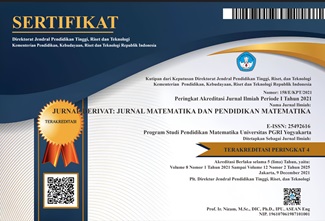Analisis Kesalahan Siswa Kelas IX MTs Al-Huda Dolok Sinumbah Kabupaten Simalungun Dalam Menyelesaikan Soal Persamaan Kuadrat
DOI:
https://doi.org/10.31316/jderivat.v10i2.1966Abstract
This study aims to identify and describe student errors based on concepts errors, principles errors, and operations errors in solving quadratic equation material. This type of research is descriptive qualitative. The subjects of this study were the IX grade students of MTs Al-Huda Dolok Sinumbah Simalungun in the 2021/2022 academic year as many as 20 people, and the samples were taken were 10 people with the most error criteria. Data was collected using a written test. Based on the results of data analysis, it can be found that students' errors in solving quadratic equations are: (1) conceptual errors, namely not knowing the concept of determining a quadratic equation, not knowing the concept of finding the roots of a quadratic equation, and not knowing the concept of determining a new quadratic equation. (2) principles errors, namely students do not know how to determine quadratic equations. (3) operation errors, namely student errors in calculating multiplication results.
Keywords: Error Analysis, Quadratic Equation
References
Amir, M. F. 2015. Analisis Kesalahan Mahasiswa PGSD Universitas Muhammadiyah Sidoarjo Dalam Menyelesaikan Soal Pertidaksamaan Linier. Jurnal Edukasi, 1(2), 131-145.
Anggraini, Y. P., & Kartini. 2020. Analisis Kesalahan Siswa Dalam Menyelesaikan Soal Persamaan Kuadrat Pada Siswa Kelas IX SMPN 2 Bangkinang Kota . AXIOM : Jurnal Pendidikan dan Matematika, 9(2), 210-223.
Haryono. 1988. Penelitian tentang Kesalahan-Kesalahan dalam Memecahkan Soal-Soal Matematika Mahasiswa FPMIPA IKP Surabaya tahun Akademik 1987-1988. Surabaya: PPS IKIP Surabaya.
Miles, M.B. and Huberman A.M. 1994. Qualitative Data Analysis: An Expanded Sourcebook. Sage Publications.
Rahayuningsih, P. dan Qohar, A. 2014. Identifikasi Kesalahan Siswa Smp Dalam Menyelesaikan Soal Cerita Matematika Materi Sistem Persamaan Linier Dua Variabel Berdasarkan Metode Analisis Kesalahan Newman (Studi Kasus Smp Bina Bangsa Surabaya). Jurnal: Jurnal Pendidikan Matematika dan Sains, No. 2.
Rahmania, L., & Rahmawati, A. 2016. Analisis Kesalahan Siswa Dalam Menyelesaikan Soal Cerita Persamaan Linear Satu Variabel. Jurnal Matematika dan Pendidikan Matematika, 1(2), 165-174.
Ramadhani, A.N., Yuwono, I., Muksar, M. 2016. Analisis Kesalahan Siswa Kelas VIII SMP Pada Materi Aljabar serta Proses Scaffolding-nya. Jurnal: Silogisme. 1(1).
Sugiyono. 2014. Metode Penelitian Pendidikan (Pendekatan Kuantitatif, Kualitatif, dan R&D). Bandung: Alfabeta.
Sukirman. 1985. Identifikasi Kesalahan-Kesalahan yang Diperbuat Siswa KElas III SMP Pada Setiap Aspek Penguasaan Bahan Pelajaran Matematika. Tesis, PPs IKIP Malang, Surabaya.
Sutiarso, S. 2009. Scaffolding Dalam Pembelajaran Matematika. Prosiding Seminar Nasional Penelitian, Pendidikan dan Penerapan MIPA (pp. 527-530). Yogyakarta: Universitas Negeri Yogyakarta
Yulia, R., Fauzi, & Awaluddin. 2017. Analisis Kesalahan Siswa Mengerjakan Soal Matematika di Kelas V SDN 37 Banda Aceh. Jurnal Ilmiah Pendidikan Guru Sekolah Dasar FKIP Unsyiah, 2(1), 124-131.
Published
Issue
Section
Citation Check
License
Copyright (c) 2023 Jurnal Derivat: Jurnal Matematika dan Pendidikan Matematika

This work is licensed under a Creative Commons Attribution-ShareAlike 4.0 International License.
Authors who publish with this journal agree to the following terms:
-
Authors retain copyright and grant the journal right of first publication with the work simultaneously licensed under a Creative Commons Attribution-ShareAlike 4.0 International License that allows others to share the work with an acknowledgment of the work's authorship and initial publication in this journal.
- Authors are able to enter into separate, additional contractual arrangements for the non-exclusive distribution of the journal's published version of the work (e.g., post it to an institutional repository or publish it in a book), with an acknowledgment of its initial publication in this journal.
- Authors are permitted and encouraged to post their work online (e.g., in institutional repositories or on their website) prior to and during the submission process, as it can lead to productive exchanges, as well as earlier and greater citation of published work (See The Effect of Open Access).







